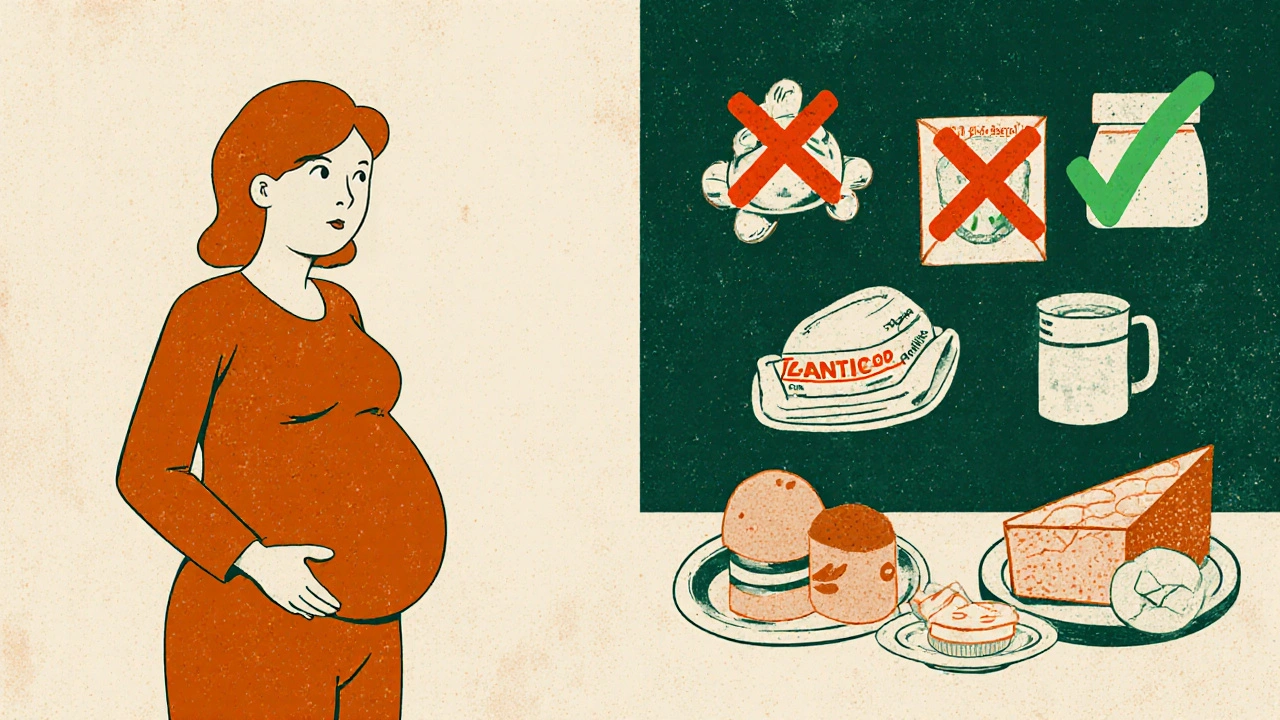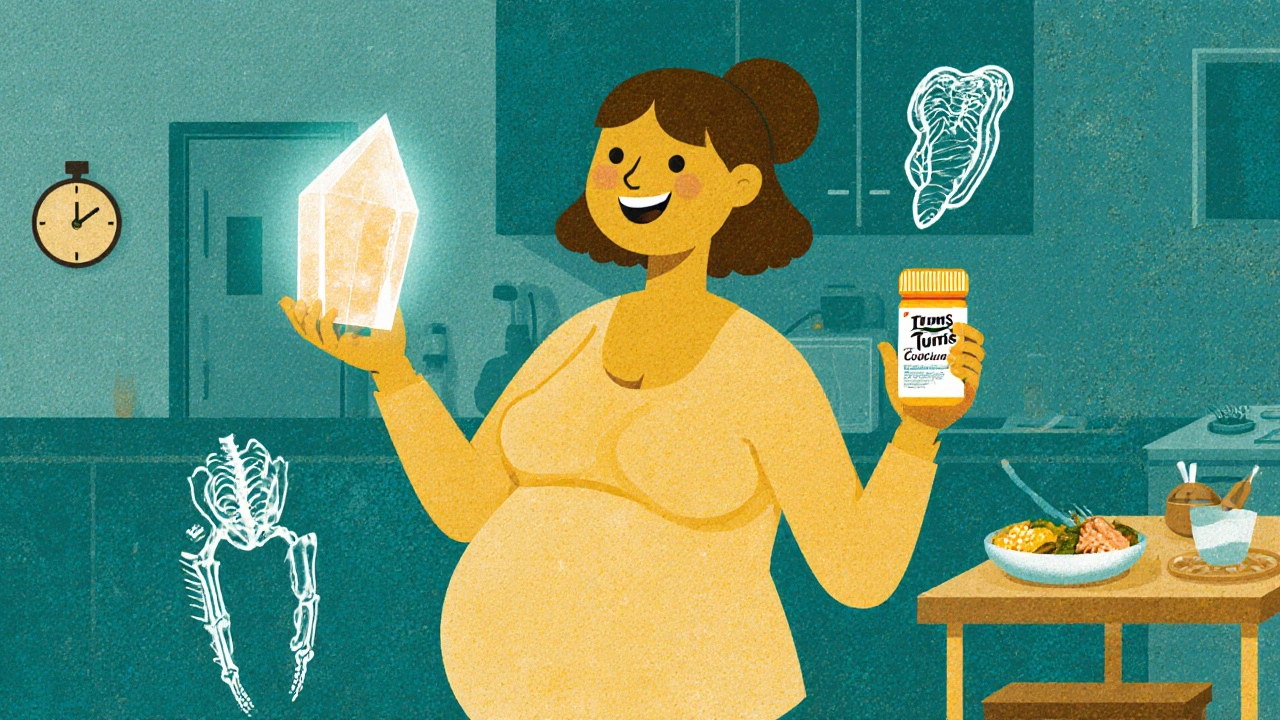Heartburn during pregnancy isn’t just uncomfortable-it’s incredibly common. Up to 80% of pregnant people experience it, especially in the second and third trimesters. The growing baby presses on the stomach, and pregnancy hormones relax the valve that keeps acid down. You might feel that burning sensation after eating, when lying down, or even in the middle of the night. It’s not just a nuisance; it can disrupt sleep, make eating a chore, and leave you feeling drained. But before you reach for any over-the-counter bottle, you need to know what’s actually safe-for you and your baby.
First-Line Defense: Calcium Carbonate Antacids
When it comes to heartburn relief in pregnancy, calcium carbonate is the gold standard. Brands like Tums, Rolaids, and some store equivalents work by neutralizing stomach acid right where it’s causing trouble. They start working in minutes and last for about an hour or two. But here’s the bonus: calcium is something your baby needs to build bones and teeth. So when you take a Tums, you’re not just easing your heartburn-you’re helping your baby grow too.Most experts agree: start here. If you’re in your first trimester and feeling that familiar burn, calcium carbonate is the safest first step. The American College of Obstetricians and Gynecologists (ACOG) and major clinics like Cleveland Clinic and Austin Gastroenterology all point to calcium carbonate as the preferred initial treatment. Dosing is simple: 500-1500 mg every 4 to 6 hours as needed. Don’t go over 7,500 mg in a day unless your provider says otherwise. Too much calcium can lead to constipation or kidney stones, but that’s rare if you stick to the recommended dose.
Not all antacids are created equal. Avoid anything with aluminum hydroxide long-term-it can cause constipation and may build up in your system. Magnesium trisilicate? Skip it. It’s been linked to possible risks in animal studies, and there’s no reason to take the chance. Mylanta is okay if it’s the version without trisilicate, but always check the label. And never, ever use Pepto-Bismol. It contains bismuth subsalicylate, which is related to aspirin, and aspirin during pregnancy can affect fetal development and increase bleeding risk.
Second-Line: H2 Blockers Like Famotidine
If antacids aren’t cutting it-maybe you’re getting heartburn multiple times a day, or it wakes you up at night-your provider might suggest an H2 blocker. These medications don’t neutralize acid. Instead, they tell your stomach to produce less of it. The most commonly used and safest in pregnancy is famotidine (Pepcid). It starts working in about an hour and lasts up to 12 hours, so you can take it before meals to prevent symptoms.Why famotidine and not others? Because ranitidine (Zantac) was pulled from the market in 2020 after the FDA found it contained NDMA, a probable carcinogen. That left famotidine as the only H2 blocker with solid, long-term safety data in pregnancy. Studies tracking thousands of pregnant people who took famotidine show no increased risk of birth defects, preterm birth, or low birth weight. It’s also available over the counter, so you can get it without a prescription-but still, talk to your provider first.
Side effects are rare, but some people report mild headaches or dizziness. If you feel off after taking it, stop and check in with your care team. Don’t combine it with other H2 blockers like cimetidine (Tagamet), even though it’s also considered low-risk. Famotidine is the preferred option for a reason: more data, fewer concerns.
Third-Line: Proton Pump Inhibitors (PPIs)
If you’re still struggling after trying antacids and H2 blockers, your provider may consider a proton pump inhibitor (PPI). These are the strongest acid reducers available. Omeprazole (Prilosec) is the most studied PPI in pregnancy, with data from multiple large studies showing no clear link to major birth defects. Lansoprazole (Prevacid) and pantoprazole (Protonix) are also used, but they have less data behind them.Here’s the catch: PPIs are not first- or even second-line. They’re reserved for persistent, severe heartburn that’s not responding to simpler treatments. Why? Because while they’re generally safe, there are still open questions. A 2019 study in JAMA Pediatrics found a small association between first-trimester PPI use and childhood asthma, but it didn’t prove cause and effect. It’s a signal to be cautious, not a reason to panic.
Long-term use of PPIs-even outside pregnancy-can affect calcium absorption and increase the risk of bone fractures. In pregnancy, this matters because your body’s calcium needs are already high. Your provider will weigh the benefits of symptom relief against any potential long-term effects. Most will prescribe the lowest effective dose for the shortest time possible.

What to Avoid Completely
There are several heartburn medications you should never take during pregnancy:- Pepto-Bismol and other bismuth subsalicylate products-contain aspirin-like compounds.
- Ranitidine (Zantac)-removed from the market in 2020 due to cancer-causing contaminants.
- Aluminum-containing antacids for long-term use-can cause constipation and possible toxicity.
- Magnesium trisilicate-no proven safety data in pregnancy.
- Any herbal remedy or unregulated supplement-many have unknown effects on fetal development.
Even if something is labeled “natural” or “herbal,” don’t assume it’s safe. The FDA doesn’t regulate supplements the same way it does medications. If you’re unsure, skip it.
Non-Medication Strategies That Actually Work
Medications help, but they’re not the whole story. Many people find that lifestyle changes reduce or even eliminate heartburn without needing pills at all. Here’s what works:- Eat smaller meals-five or six mini-meals a day instead of three large ones.
- Avoid trigger foods: spicy, fried, fatty, or acidic foods like citrus, tomatoes, coffee, and chocolate.
- Wait at least three hours after eating before lying down or going to bed.
- Elevate the head of your bed by 6 to 8 inches using blocks or a wedge pillow.
- Wear loose clothing-tight waistbands put extra pressure on your stomach.
- Don’t smoke. Smoking relaxes the lower esophageal sphincter and increases acid reflux.
These aren’t just “nice to try.” They’re evidence-backed. Studies show that combining lifestyle changes with medication leads to better outcomes than medication alone. And in the first trimester-when your baby’s organs are forming-avoiding medication entirely is often the best choice. If you can manage with diet and posture, that’s ideal.

When to Call Your Provider
Not every burning sensation is just heartburn. Sometimes, it’s something more serious. Call your provider if you experience:- Heartburn that doesn’t improve with medication or lifestyle changes.
- Difficulty swallowing or pain when swallowing.
- Vomiting blood or black, tarry stools-signs of bleeding.
- Unexplained weight loss.
- Chest pain that radiates to your arm, jaw, or back-could be heart-related.
These could point to complications like esophagitis, a hiatal hernia, or even a cardiac issue. Don’t wait. Get checked.
What About Breastfeeding?
If you’re breastfeeding after delivery, you might still be dealing with heartburn. The good news: the medications we’ve talked about are generally safe while nursing. Calcium carbonate passes into breast milk in tiny, harmless amounts. Famotidine and omeprazole also enter breast milk in very low levels, and no adverse effects have been reported in nursing infants. Still, always check with your provider before restarting any medication after birth. Your body’s changed, and your needs might be different.Can I take Tums every day during pregnancy?
Yes, Tums (calcium carbonate) can be taken daily during pregnancy if needed for heartburn. It’s considered safe and even provides extra calcium your baby needs. Stick to the recommended dose-no more than 7,500 mg per day-and talk to your provider if you’re using it regularly beyond the first trimester. Long-term use should be monitored to avoid constipation or excess calcium.
Is famotidine (Pepcid) safe in the first trimester?
Yes, famotidine is considered safe to use in the first trimester. Unlike some medications, it has been studied in large groups of pregnant women and hasn’t been linked to birth defects or complications. However, many providers still recommend trying non-medication methods first during the first 14 weeks, when fetal development is most sensitive. If symptoms are severe, famotidine is a low-risk option.
Can omeprazole cause birth defects?
Large studies have not found a clear link between omeprazole and birth defects. It’s one of the most studied PPIs in pregnancy, and the available data shows no significant increase in major malformations. However, a 2019 study suggested a possible association with childhood asthma when used in the first trimester-though this doesn’t mean it causes asthma. Omeprazole should only be used if other treatments fail and under medical supervision.
Why is Pepto-Bismol dangerous during pregnancy?
Pepto-Bismol contains bismuth subsalicylate, which breaks down into salicylates-similar to aspirin. Aspirin during pregnancy can interfere with fetal development, increase the risk of bleeding, and affect the baby’s heart and lungs. Even small amounts can be harmful, especially in the third trimester. Always avoid Pepto-Bismol and any product containing salicylates while pregnant.
What’s the best time to take heartburn meds during pregnancy?
For antacids, take them 1 hour after meals and at bedtime, when symptoms are most likely. H2 blockers like famotidine work best if taken 30-60 minutes before eating to prevent acid buildup. PPIs like omeprazole are most effective when taken 30 minutes before your first meal of the day. Timing matters-taking meds at the right time can cut your dose in half and reduce side effects.
Heartburn in pregnancy is normal-but you don’t have to suffer through it. With the right tools, you can find relief without putting your baby at risk. Start with lifestyle changes. Then, if you need more, use calcium carbonate antacids. If that’s not enough, talk to your provider about famotidine. Save PPIs for when nothing else works. And always, always check with your care team before taking anything new. Your body is doing something extraordinary. Treat it with care.


Scott Macfadyen
Finally, someone laid out the truth without the pharmaceutical fluff. Tums are basically baby calcium supplements with a side of relief. I took them daily in my third trimester and my kid came out with a full head of hair. No joke.
Also, never trust anything that says 'natural' on the label unless it's a banana.